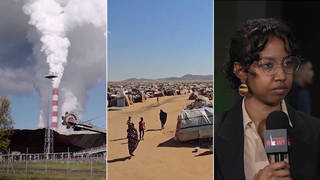The Native American elder and activist Elouise Cobell has died at the age of 65. A member of the Blackfeet Nation, she was the lead plaintiff in a landmark 1996 lawsuit claiming the U.S. Department of Interior had misspent, lost or stolen hundreds of billions of dollars meant for Native American land trust account holders dating back to the 1880s. After a nearly 15-year legal battle, the U.S. government settled for $3.4 billion, the largest government class action settlement in U.S. history. The beneficiaries are estimated to be about 500,000 people. Elouise Cobell also helped found the first bank to be owned by an American Indian nation, the Blackfeet National Bank, which is now the Native American Bank. In 2009 she spoke in Washington, D.C., when the landmark settlement was announced.
Elouise Cobell: “Although we have reached a settlement totaling more than $3.4 billion, there is little doubt this is significantly less than the full accounting to which individual Indians are entitled. Yes, we could prolong our struggle and fight longer, and perhaps one day we would know, down to the penny, how much individual Indians are owed. Perhaps we could even litigate long enough to increase the settlement amount. But we are compelled to settle now by the sobering realization that our class grows smaller each year, each month and every day, as our elders die and are forever prevented from receiving their just compensation.”










